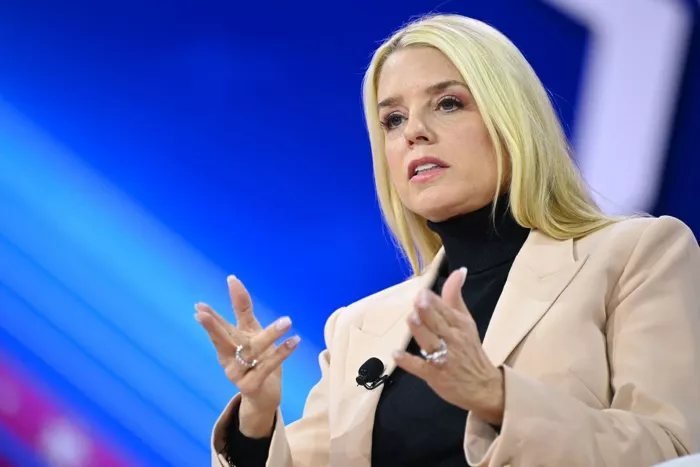Former Florida Attorney General Pam Bondi is facing mounting criticism from prominent Christians and conservative commentators after recent remarks suggesting that the government should actively pursue “hate speech.” Her comments, made during a podcast interview, have sparked widespread alarm among those who view her statements as not only misguided but also dangerous to the First Amendment’s protections.
Bondi told host Katie Miller that “there’s free speech and then there’s hate speech,” adding that “there is no place for hate speech in the U.S., especially after what happened to Charlie Kirk.” She went further, asserting that law enforcement would “absolutely target” groups engaged in such speech.
To many Christians and constitutional conservatives, those words amounted to a chilling suggestion that government officials could prosecute citizens simply for expressing views deemed offensive.
Following backlash, Bondi attempted to clarify her remarks in a follow-up interview, insisting that the Department of Justice would not prosecute ordinary Americans for unpopular opinions but would focus on criminal groups or individuals inciting violence. Still, her initial framing was enough to ignite strong opposition, particularly from Christian leaders who have long warned about the dangers of ambiguous “hate speech” legislation.
Conservative commentator Tucker Carlson, host of “The Tucker Carlson Show,” condemned Bondi’s comments in an episode of his TCN show on Sept. 16 and again during an exclusive live broadcast with journalist Michael Shellenberger Wednesday night in a special episode titled “The End of Free Speech.”
“There’s no sentence that Charlie Kirk would have objected to more than that,” Carlson said, referring to Bondi’s remarks distinguishing hate speech from free speech.
Dr. Robert Jeffress, pastor of First Baptist Dallas, was among the first to respond. He stated bluntly that “hate speech is free speech,” warning that allowing the state to police words is a direct assault on the Constitution. Jeffress emphasized that the same government empowered to punish white supremacists today could one day criminalize biblical sermons tomorrow. “The moment the government decides what is or isn’t hate, Christian teaching becomes vulnerable,” he cautioned.
John MacArthur, the recently passed away pastor of Grace Community Church in California, frequently voiced similar concerns over the attack on free speech. “What is framed as hate speech today is often nothing more than quoting Scripture,” he said. MacArthur pointed to examples in Canada and Europe, where pastors have been fined or threatened with jail for simply preaching biblical passages on marriage and sexuality. “If we allow this mentality to take root here,” he argued, “the freedom to preach Christ crucified will be at stake.”
Tony Perkins, president of the Family Research Council, underscored the political implications of Bondi’s words. He noted that hate speech regulations are rarely enforced evenly. “When government power is directed against so-called hate speech, it is almost always conservatives and Christians who are silenced first,” Perkins said. He warned that Bondi’s rhetoric—whether intentional or not—strengthens the left’s narrative that Christian convictions are inherently dangerous.
Albert Mohler, president of Southern Baptist Theological Seminary, highlighted the distinction between offensive expression and actual incitement to violence. “The Constitution protects speech that others find hurtful or distasteful,” Mohler explained. “If it did not, we would have no free speech at all.” He argued that conflating offensive commentary with criminal conduct reflects either a poor understanding of constitutional law or a willingness to chip away at liberty for political expediency.
Allie Beth Stuckey, a popular Christian apologist and podcast host, also weighed in. She warned that Christians cannot afford to ignore incremental threats to freedom of expression. “If we don’t protect the rights of those with whom we disagree, we will lose our own rights when those in power disagree with us,” Stuckey said. Her comments reflected a broader anxiety that vague categories like “hate speech” will inevitably be weaponized against Christian teaching.
The assassination of conservative activist Charlie Kirk earlier this month provided the context for Bondi’s remarks, but critics insist his tragic death should not be used to justify restrictions on liberty. Eric Thompson, host of the Eric Thompson Show, argued that Bondi’s words undermine the principles upon which America was founded. “The Founders did not carve out exceptions to free speech based on offense,” Thompson noted. “Pam Bondi’s remarks play directly into the left’s narrative that truth can be reclassified as hate.”
Thompson further stressed that Christians must resist any attempt to conflate biblical morality with dangerous extremism. “If a pastor preaches Romans 1 or Genesis 2 and the government decides that’s hate speech, what happens then? The church cannot allow Caesar to dictate what is and is not acceptable truth,” he said. His warning echoed centuries of church history, where state power often sought to silence or punish the faithful.
Bondi’s clarification has done little to ease conservative concerns. Many argue that when high-ranking officials suggest hate speech deserves government attention, it signals to activists and bureaucrats that Christian doctrine is fair game for censorship. In their view, liberty is not lost in a single moment but is chipped away through vague language, well-intentioned policies, and political pressure following national tragedies.
The controversy underscores the ongoing battle between those who wish to expand government authority in the name of safety and those who insist liberty must remain non-negotiable. For Christians, the stakes are uniquely high. As Tony Perkins remarked, “We must defend freedom of speech even when it costs us, because once it is lost, the church will lose its prophetic voice.”
In the end, Bondi’s comments have reminded believers of a timeless truth: rights not vigorously defended are rights easily lost. For the pastors, theologians, and advocates pushing back, the issue is not merely about politics or rhetoric—it is about ensuring that the Gospel can continue to be proclaimed without interference from a government empowered to label truth as hate.
Keywords
Pam Bondi – hate speech – free speech – First Amendment – Christian leaders – conservative pushback – Robert Jeffress – John MacArthur – Tony Perkins – religious liberty

